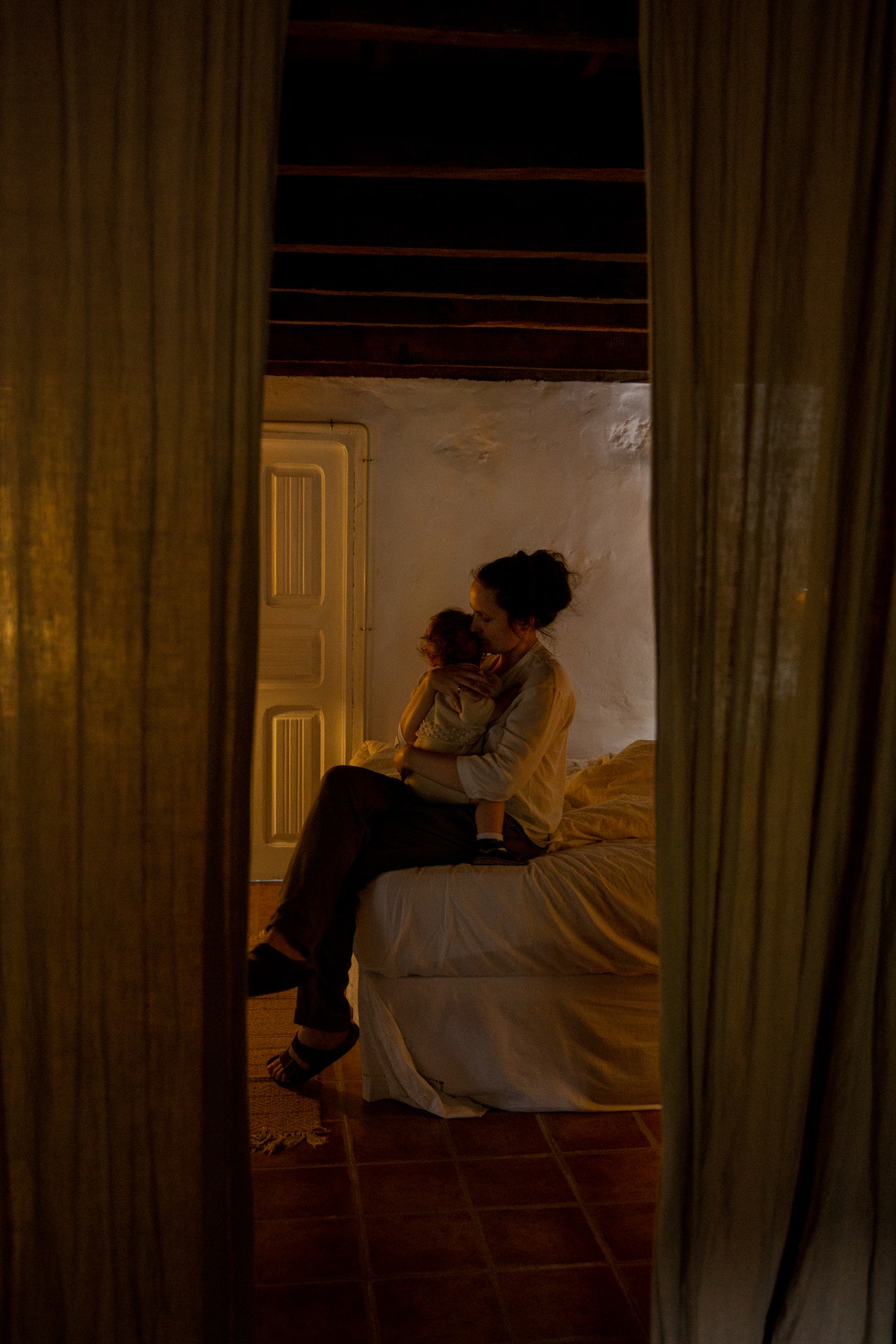
I’ve recently realized the so-called “realism” I’ve been aiming to instill into my children as they grow has gotten lost in translation somewhere between my convoluted brain and their innocent, wide-open, vulnerable, pristine brains and is being absorbed as belly-twisting, life-altering anxiety toward a cruel, scary, unreliable, and seemingly unsafe world.
This is not at all the worldview I carry; it should be noted. I am a doting, loving, compassionate, and deeply empathetic woman and mother. I find beauty in all things, even those most would find repugnant. I’ve instilled deep love and compassion for all things living in my children, no matter their size or appearance.
My now 17-year-old daughter will delicately and lovingly pick a spider up with her bare hands and talk to it as if it’s a Labrador. “What are you doing in this house, little man? You’re lucky I’m the one that found you. Let’s go outside. Does this flower look safe? I think so. Have a nice life, little guy.”
My 12-year-old son, although terrified of insects, has more empathy and compassion within his little heart than most adults and will go out of his way to make you laugh until your face hurts if he senses you are anything but happy.
Both of my children are ADHD diagnosed (attention-deficit/hyperactivity disorder) and have struggled tremendously with anxiety issues. Finding a therapist has become a year-long process, if not more. For adults, it sucks. For children, it should be illegal. Declining mental health, no matter the age, is absolutely an epidemic right now. Therapists are in short supply as they are either totally booked, not seeing any new patients, or simply don’t take our sh*tty, state-funded insurance. I work in the healthcare industry and have the insider’s scoop on hordes of therapists simply quitting their profession entirely due to their own mental health overload. They are more in demand now than ever. My heart goes out to them.
Seeing as my kiddos have different fathers, I’m not blind to the fact that I am the common genetic denominator in this whole ADHD/severe anxiety thing. Although I do wholeheartedly believe that there are (many) other contributing factors that lend to the substantial increase in ADHD in children over the last few decades, I certainly accept responsibility for contributing to my children’s mental health both genetically and subconsciously, whether it be good or bad.
It seems you can’t open any social media page these days without stumbling upon a meme or article that places blame on our parents for causing detrimental damage to us as children. Terms like “narcissist” have become downright trendy. While I’m 100 percent here for realizing why we are the way we are and helping to jumpstart the healing process through said self-realization, I’m equally here to remind us that we are all human—even our parents—which means we are all inherently fallible, flawed, and truthfully just learning as we go. There’s no guidebook. Well, I suppose there are thousands, but they are also written by inherently fallible, flawed, and learning-as-they-go human beings.
My father was just 19 and my mother was 20 when I came into this world. I was 22 when I gave birth to my own daughter. I turned 40 a week ago, and on my birthday my father said to me over the phone, “You know, Shel, my mom was almost 40 when she had me. I’ve realized one of the coolest things about having you when we were so young is that we’ve grown up together.”
I’ve been stewing, in a good way, on that remark ever since. We absolutely grow up with our children, no matter the age you are at their conception and birth, because we are constantly learning and growing. Age doesn’t stop that process. Disease might eventually, but age certainly doesn’t.
I’ve been a parent for nearly 18 years and I’m now realizing I’ve likely screwed up my own children mentally. Harsh, maybe, but I feel we’re so quick to jump on the “Wow, my parents really did screw me up” blame-train as adults; it needs to be just as easy to jump on the “Okay, well maybe I am partially responsible for my children’s struggles” train.
I both cannot and will not place the full blame on the internet, nor the “way of the world.” I’m at fault because I am their mother. I am their hard drive, and they are my little flash drives. Through my own inherent (albeit also learned) subconscious cynicism and trauma, I’ve handed the genetics they already carried within them bushels of food for the nourishment of their respective anxieties.
As with most, I’ve been through immeasurably traumatic things that have planted seeds of cynicism within my otherwise annoyingly optimistic personality. Seeds that were then watered by compounded experiences, which then shot up like invasive super-weeds within the hidden parts of my psyche that I’m only now able to catch glimpses of. Weeds that, as a sub-product, caused me to want to always be deeply honest with my children so as to provide the space for them to be deeply honest with me in return.
I want to be their safe space, always. I don’t want them to ever feel judgement or shame from me—only support. I don’t feel I’ve ever had this in my own life, so this has become my driving force as a mother. Sounds innocent enough as it’s worded, but I’ve come to realize honesty isn’t always the best policy when conversing with children whose thought (logic and reasoning) synapses are still forming and vulnerable.
For example, my son received a metal detector for Christmas. It’s his current favorite thing on the planet. Few things bring him more joy than taking that bad boy out to the woods behind our house and digging for treasure. “We could find diamonds, mom!”
So, tell me why my immediate response to him was, “There are no diamonds here in Massachusetts, babe.”
Right after I heard the words spew from my lips, I reprimanded myself. How dare I take away his joy! His excitement! His unabashed childhood naivety and curiosity! How hurt had I been as a child when my own excitement was crushed by the words of an adult? And wouldn’t you know, while I’ve got myself bent over my mind’s metaphorical knee, swatting my own ass harshly with a paddle for my error, my son says, “Mom, why do you always do that? Just let me be excited!”
Of course, now I’ve turned my face to the bitter wind to wipe away tears before he notices. (Which again, why hide real emotions from him?)
I apologized, and from that moment I became much more aware of the thoughts running through my head in response to his questions and comments. He’d say things like, “Mom, it’s beeping big! I bet this one is money!” and I’d instantly think, “… it’s just the invisible fence wire.” How about I just zip my damn lips and let him enjoy that temporary elation because the day will come, far too soon, when that feeling of pure elation comes less and less.
How dare I steal that from him? When did I become such a Debbie Downer?
Being the overthinker I am, I’ve spent nearly every hour since reliving every word I might have said to either of my children to cause their anxieties to multiply…and there are many. I pride myself on being extremely self-aware, so this was a major wake-up call.
I couldn’t have known in those moments. We never do! Had I known, I never would have let the words escape my mouth. I exist for my children; I’ve moved and continue to move mountains for them. I would never intentionally damage them in any capacity, nor do I believe most parents would intentionally mentally damage their own offspring, but we do. It’s inevitable.
I was raped at 17. So, years ago when I taught my young daughter about stranger-danger I may have gone a bit too far without realizing it—instilling deep-seated fear masked as an abundance of caution, transplanted directly from my brain into hers. She has major social anxiety and has struggled in the past with being able to approach kids her age to make friends. Was I the cause?
I accept the blame regardless and can never truly be apologetic enough. I may not be the sole cause of that anxiety, but it goes without question that I fed it. I unintentionally brought an entire Thanksgiving Day feast to that beast. Acknowledging the truth, accepting blame, and apologizing profusely won’t fix what’s broken, but together they can absolutely act as the stepping stones for healing.
“If you break a plate and then glue it back together, will it ever truly go back to its original form?” ~ Anonymous
I think it’s high time we shift our focus from who’s to blame (because blame will only cause guilt and shame, creating an unrelenting, vicious cycle of negative emotion, which will hinder, not help, the healing process) to focusing on an awareness of the damage we cause as parents/children/friends/spouses/siblings/human beings so that we can put a kink in that relentless cycle, and hopefully, with enough work, we can stop it completely.
Focusing more on the not-so-good subconscious habits you’ve picked up during your own time on this planet that you are passing around to those who interact with you on a daily basis on a platter unknowingly will change your entire life.
Maybe you start to realize Gerald at the office isn’t such a bad dude after all; it’s just that you’re constantly having negative interactions with him because the first three years you worked together you were going through a nasty divorce and were coming into the office with an invisible chip on your shoulder. He learned to approach you cautiously, and because of that, you were never able to establish a true connection that rings truer to who each of you are as individuals.
Maybe you begin to realize as a medical practitioner, your staff and patients aren’t all that ill-tempered and ignorant after all; it’s just that you’re coming in to work each day failing the parking lot test* before you even walk through the door and start your day.
(*The “parking lot test” is when you drive to work and are sitting in your vehicle before exiting. How do you feel? Good, bad, sick to your stomach? You’re going to inevitably carry that energy inside your workplace with you as invisible luggage you’ll tote around all day long, so check in—honestly—with yourself daily.)
Mindfulness is key. Self-awareness is key. Acceptance, accountability, and forgiveness are key.
Grab a pen and paper and write these down. I did. Put them in your wallet. Reflect on them daily, or as often as you can remember to.
Take a few deep breaths and repeat these either aloud or in your mind:
I aim to be a better, more mindful parent (or human being) from this point forward.
I cannot change the past, but I am constantly creating the future for myself and those around me.
I aim to become hyper-aware of how my subconscious beliefs affect those around me.
I aim to be increasingly mindful of my thoughts and my words with each passing day, as they are the clay that shapes my life.
I forgive myself for any pain I have caused others unintentionally.
I forgive those who have caused me pain unintentionally.
I, alone, am responsible for my life and for the energy I introduce to the world around me.
Together, we can change the world one mindful word at a time.
~
Please consider Boosting our authors’ articles in their first week to help them win Elephant’s Ecosystem so they can get paid and write more.











Read 10 comments and reply